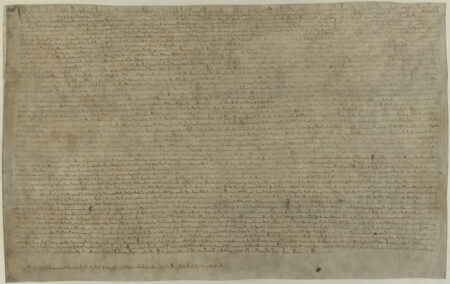Research by two medieval history professors shows that a manuscript once considered an unofficial copy of Magna Carta, which Harvard bought in 1946 for just $27.50, is a lost original Magna Carta from 1300, in the reign of King Edward I.
After Harvard Law School bought just after the Second World War, it remained tucked away in its library, its true identity unknown, according to the BBC.
However, research by Professor Nicholas Vincent of the University of East Anglia, Norwich and Professor David Carpenter of King’s College London has shown that the Harvard document is an extraordinarily rare original.
According to Harvard’s library accession register, the document catalogued as HLS MS 172 was acquired in 1946 and was described in an auction catalogue as a “copy made in 1327… somewhat rubbed and damp-stained”.
The manuscript’s purchase price of $27.50 would be about $450 today, based on inflation.
Today, 25 of these originals survive from the various editions between 1215 and 1300, most of which are in the UK.
Two are held in Washington DC’s National Archives, and one in Parliament House in Canberra, Australia.
It is thought the Harvard document is from the town of Appleby, Cumbria.
According to the BBC, the two professors think the trail from Appleby to Harvard involves the Lowthers, a land-owning family who gave the document to Thomas Clarkson, a leading abolitionist of the 1780s. Clarkson’s estate passed through a series of heirs to the Maynard family, then at the end of 1945, AVM Forster Maynard sold it at auction at Sotheby’s.
A London bookseller paid £42 for the document, months before Harvard bought it for a fraction of that price.
Professor Vincent said of its value today: “I would hesitate to suggest a figure, but the 1297 Magna Carta that sold at auction in New York in 2007 fetched $21m….”
Magna Carta, a charter first issued by King John in 1215, guaranteed the liberties and rights of his subjects and also placed the Crown under the authority of the law.
The charter is considered a key step in the evolution of human rights against oppressive rulers, which has influenced the framing of constitutions around the world.
Image: British Library, CC0, via Wikimedia Commons

